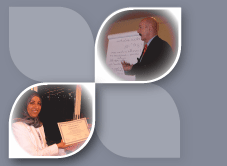CHAIRMAN'S MESSAGE
The Eastern Mediterranean region will develop rapidly ageing
populations within the next few decades. The traditional patterns
of family responsibility will diminish with economic development.
In our society, the eldest members are a source of spiritual
blessing as well as models of, religious faith, wisdom and love.
Accordingly, the family as a group assumes responsibility for
their welfare and survival by helping them with daily chores,
and giving them financial assistance and emotional support.
While such customs and traditions persist today predominantly
in rural areas, it is proving impossible for many people and
groups to preserve this aspect of their culture in the face
of inimical forces over which they have no control.
A rising geriatric population, with increasingly unmet health
care needs, strongly suggests the necessity for a better educational
preparation of those health professions actually or potentially
serving them. The absence of sufficient numbers of trained geriatricians
and gerontologists, among health professionals, seriously undermines
the ability of the country's health care system to adequately
assess, treat, and rehabilitate the growing ageing population.
This shortage leads to inappropriate care, higher costs, and
poorer patient outcomes. Education is key to more informed health
care services, without which, fertile soil exists for the emergence
of negative attitudes and stereotypes toward ageing and older
people. This may lead to avoidance and neglect of the elderly
and their problems. The Middle-East Academy for Medicine of
Ageing may help in preparing health professional sensitivity
to the issue of aging, thus help in improving the quality of
life of the elderly in the region.







